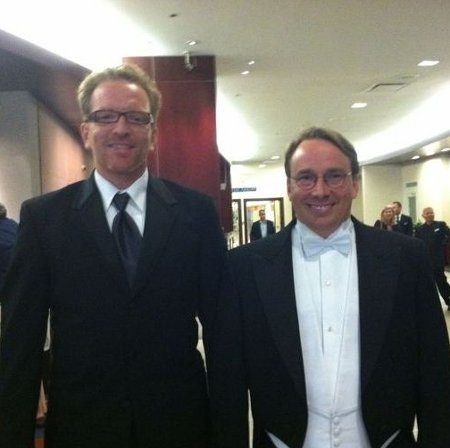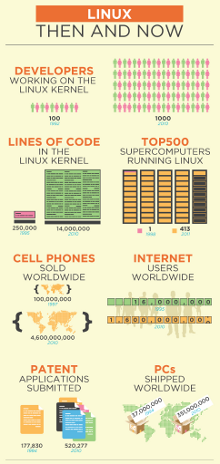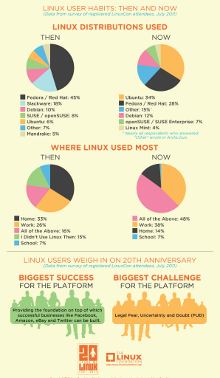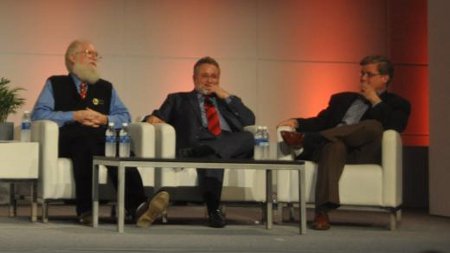LinuxCon wishes happy 20th to Linux
Aug 19, 2011 — by Eric Brown — from the LinuxDevices Archive — viewsThe LinuxCon conference that ended Aug. 19 in Vancouver featured a 20th Anniversary Gala for Linux and plenty of discussions on a fast-changing industry. Highlights included a call for a long-term Linux kernel, keynotes from Red Hat CEO Jim Whitehurst and IBM Linux guru Irving Wladawsky-Berger, and fork-loving Linus Torvalds taking a mellow approach to the code rift with Android.
We couldn't make it to Vancouver for this week's LinuxCon show, which wrapped up Aug. 19, but thanks to the Internet — much of it running on Linux servers — we felt we were right alongside Linus Torvalds and the gang as they celebrated 20 years of Linux.

Intel's Dirk Hohndel and Linus Torvalds head for the 20th Anniversary Gala
Source: Linux Foundation
There wasn't a huge amount of news out of LinuxCon, but there were plenty of interesting discussions, some of which we've encapsulated below. The major announcement came on the opening day when the Linux Foundation, which hosts LinuxCon — and the Linux kernel project itself — announced the release of SPDX 1.0, a standard for sharing open source license information. SPDX (Software Package Data Exchange) aims to streamline reporting of open source licensing information to make it easier to comply with open source licenses.
Long-term kernel plan could help Linux smartphones
Also of interest to embedded Linux folks in particular was the announcement by Linux kernel maintainer Greg Kroah-Hartman of a plan to establish a long-term support system for new versions of the Linux kernel, in order to help out Linux-based smartphones. As further explained by Gavin Clarke in The Register, the plan calls for the Linux community to each year choose a version of the kernel that it will commit to maintain for two years, before switching to a new long-term kernel.
 A long-term kernel would make it easier for consumer electronics devices, which are notable for their short lifespans, to call upon the support of a standard base kernel. Such a stabilized kernel would come with a commitment from maintainers to provide bug fixes, security, and hardware updates, says Kroah-Hartman (pictured at left). As a result, it should reduce costs associated with implementing fixes and updates on products that have short lifespans and tight margins, but require dependable operation, he adds.
A long-term kernel would make it easier for consumer electronics devices, which are notable for their short lifespans, to call upon the support of a standard base kernel. Such a stabilized kernel would come with a commitment from maintainers to provide bug fixes, security, and hardware updates, says Kroah-Hartman (pictured at left). As a result, it should reduce costs associated with implementing fixes and updates on products that have short lifespans and tight margins, but require dependable operation, he adds.
In many ways, this is similar to what Red Hat and other enterprise distro vendors do for their own customers. It appears that an official long-term kernel could also be used by those vendors, as well as by Android vendors and others using embedded Linux in consumer electronics. The plan appears to be in its early stages.
LinuxCon keynotes: imagining a world without Linux
Linux Foundation (LF) executive director Jim Zemlin started off the LinuxCon keynotes Aug. 17 by asking attendees to try to imagine a world without Linux, according to a review by Ryan Paul in Ars Technica. Zemlin then emphasized the important role that copyleft licensing and open source values in general have played in Linux' success.

Jim Zemlin at LinuxCon's 20th Anniversary Gala
Source: Linux Foundation
The success of Linux has yet to fully arrive on the desktop PC, despite a short-lived bloom of Linux netbooks, and Zemlin admitted that "the year of the Linux desktop" has yet to arrive. Yet, there are plenty of Linux success stories in the supercomputer, server, and embedded worlds. Earlier this week, the LF released a series of related infographics, showing various before and after takes on Linux, as shown below.


Linux Then and Now
Source: Linux Foundation
(Click on either to enlarge)
IBM's Wladawsky-Berger on how he turned to "communist" Linux
On Aug. 18, Irving Wladawsky-Berger, a former IBM executive who was responsible for turning IBM on to Linux, used his keynote speech to examine Linux, past and future, reports Linux insider Joe 'Zonker' Brockmeier on Linux.com.
 When IBM first started considering a major switch to Linux back in 1999, there was considerable opposition to it, with many calling it a "communist conspiracy," recalled Wladawsky-Berger (pictured), now chairman emeritus of the IBM Academy of Technology and visiting professor of Engineering Systems at MIT. This was amusing, he said, considering IBM had been called a "capitalist pig" for decades.
When IBM first started considering a major switch to Linux back in 1999, there was considerable opposition to it, with many calling it a "communist conspiracy," recalled Wladawsky-Berger (pictured), now chairman emeritus of the IBM Academy of Technology and visiting professor of Engineering Systems at MIT. This was amusing, he said, considering IBM had been called a "capitalist pig" for decades.
Others complained that there was no need for another operating system at IBM. Yet, "We did not look at Linux as just another operating system any more than we looked at the Internet as just another network," Wladawsky-Berger told the audience. IBM knew that due to its open source foundations, the Linux kernel would get better and act as "a platform for innovation into the future, just like we viewed the Internet," he added.
Looking forward, he echoed a number of LinuxCon presentations by saying Linux would play a big role in the interconnected Internet of things. Linux technologies could be especially instrumental in addressing the challenges of making increasingly crowded cities more livable, he added.
Wladawsky-Berger was said to have concluded with a shout-out to IBM's new Watson supercomputer, one of many successful Linux-based supercomputer initiatives, along with a new cognitive computing chip IBM announced this week. Going forward, he also stressed the importance of preserving the community aspects of Linux.
Torvalds on Android fork
LinuxCon was no doubt abuzz about Linus Torvalds' call for a fork of the GNOME desktop due to the advent of the "crazy" GNOME 3.0. Yet, he instead chose to speak at LinuxCon about another Linux-related fork: Android.
As related by Steven J. Vaughan-Nichols on ZDNet, Torvalds joined a panel with Kroah-Hartman, who famously excised Android code from the Linux kernel in early 2010 due to Google's lack of upstream maintenance support. Tensions rose that year, despite attempts at reconciliation, but now, judging from ZDNet, both Torvalds and Kroah-Hartman have become pretty mellow fellows about the rift.
"There's still a lot of merger to be done," Torvalds told the panel audience, according to ZDNet. However, "Eventually Android and Linux would come back to a common kernel, but it will probably not be for four to five years," added the Linux creator.
Perhaps it was just the generally celebratory mood at LinuxCon, or maybe Torvalds was taking pity on Google considering all the legal attacks launched recently against the search giant. Or maybe the get-along attitude is just a matter of realpolitik.
Android has grown to own nearly half the world's smartphone market, boy is it happening. Meanwhile, with the LiMo efforts pretty much dead, MeeGo shorn of its handset project due to Nokia's exit, and this week's abandonment of WebOS by HP, there's not much else happening in Linux-based phone platforms.
"I'm not at all afraid of forks," Torvalds was quoted as saying — and judging from his recent GNOME comments, this was a surprise to no one. "Even when forks happen there are all these points of pain where two groups have had different issues. It just takes a while for people to join back, but the joining will happen. We're just going different directions for a while, but in the long run the sides will come together so I'm not worried."
Maddog, Moglen, and Frye — oh my!
On the first day of LinuxCon, Jim Zemlin sat down to talk about the first 20 years of Linux with Linux pioneer Jon "Maddog" Hall, Software Freedom Law Center (SFLC) founder Eben Moglen, and IBM VP Dan Frye, who is responsible for the IBM Linux development team. Zemlin referred to them as "The Godfather, The Lawyer, and The Suit," according to an Opensource.com report by Ruth Suehle.

Jon "Maddog" Hall, Eben Moglen, and Dan Frye at LinuxCon
Source: Opensource.com
Maddog immediately saw the light. "I got Linus an Alpha system to do the port and made a presentation for my management," he was quoted as saying. "The last slide said, 'Linux is inevitable.' I said, 'Nobody is going to be able to stop it. It's going to be very, very big.'"
Moglen installed Linux in 1994, and he "didn't look back," he said. Around the same time he began collaborating with open source pioneer Richard Stallman on Linux-based GNU projects. "I don't think there was any doubt that what I was doing was in order to facilitate this extraordinary combination of forces," Moglen told the LinuxCon audience.
 Frye didn't discover Linux until 1998, but he was quickly hooked. "We understood early on was that Linux is an enabler of innovation," he was quoted as saying. "As an enabler, it leaps and shows up in unusual places. TiVo? Come on, why? But then, why not? Supercomputers, mainframes, it goes where you don't expect it."
Frye didn't discover Linux until 1998, but he was quickly hooked. "We understood early on was that Linux is an enabler of innovation," he was quoted as saying. "As an enabler, it leaps and shows up in unusual places. TiVo? Come on, why? But then, why not? Supercomputers, mainframes, it goes where you don't expect it."
Happy birthday, Tux!
This article was originally published on LinuxDevices.com and has been donated to the open source community by QuinStreet Inc. Please visit LinuxToday.com for up-to-date news and articles about Linux and open source.